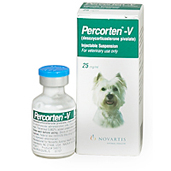Canine Addison's disease occurs when the adrenal glands, which are located near the kidneys, fail to produce sufficient levels of corticosteroid hormones to maintain health. The disease may be caused by immune-mediated damage to the glands or may result from pituitary failure to stimulate the glands into producing cortisol. Sometimes, medications, cancer, or infection may cause Addison's disease.
"Dogs with Addison's Disease require medication and close monitoring throughout life to prevent a return of the condition and to improve quality of life."
Symptoms of the disease, which are often vague and overlooked, may include diarrhea, depression, lethargy, vomiting, increased thirst, poor appetite, and muscle weakness. Diagnosis is based on test results and elimination of other conditions with similar symptoms.
Once Addison's is diagnosed, medication can return hormone levels to normal, prevent complications, and improve your dog's quality of life.
Medications for Addison's Disease in Dogs
Treating Addison's disease typically requires a daily oral medication or an injectable drug given once every 25 days. Lifestyle and dietary changes may also be necessary to manage symptoms and prevent a relapse.

Medications such as injectable Percorten-V (desoxycorticosterone pivalate) and Florinef (fludrocortisone acetate) work to replace missing aldosterone and balance electrolyte levels in dogs with primary Addison's disease. These medications are mineralcorticoids.
Mineralcorticoids are not beneficial to dogs with secondary or atypical Addison's disease because aldosterone and electrolyte levels remain regular in these forms of the illness. Instead, secondary and atypical Addison's are treated with oral prednisone or hydrocortisone to replace missing cortisol. These oral glucosteroids are also given along with mineralcorticoids to treat primary Addison's.
Your Dog's Long-Term Prognosis
Dogs with Addison's disease require medication and close monitoring throughout life to prevent a return of the condition and to improve quality of life. The good news is that current medications are very effective at managing the condition for nearly all dogs. Some dogs, such as those with other serious health problems, may require specialized care and may not respond as well to treatment.

Discuss any concerns with your veterinarian, and do not hesitate to request an appointment if your dog seems unwell or begins exhibiting Addison's symptoms while on medication. Your veterinarian will work with you to design a diet plan ideal for your dog's condition and can recommend alternative or complementary therapies to help manage symptoms of the disease. Do not give your dog any herbs, supplements, or medications without first consulting your veterinarian.
You can help your dog at home by learning everything possible about the condition and by minimizing change and stress in your dog's life. Dogs with Addison's react negatively to stressful situations, and keeping your dog as calm as possible will greatly improve his quality of life. Dogs with Addison's can live long, active lives once treatment begins.
References
http://www.vetmed.wsu.edu/cliented/addisons.aspx
http://www.addisondogs.com/
The above is provided for information purposes only and should not be used for the diagnosis or treatment of any condition.
This information does not cover all possible variables, conditions, reactions, or risks relating to any topic, medication, or product and should not
be considered complete. Certain products or medications may have risks and you should always consult your local veterinarian concerning the treatment of
your pet. Any trademarks are the property of their respective owners.